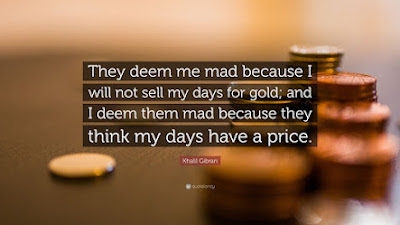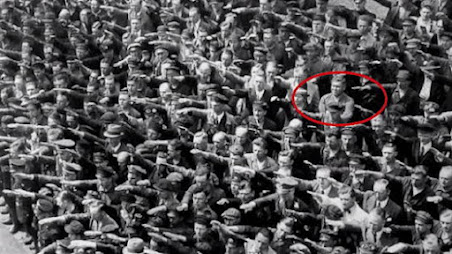"The Last Time Always Happens Now"
by David Cain
"William Irvine, an author and philosophy professor I’m a big fan of, often tries to point people towards a little-discussed fact of human life: "You always know when you’re doing something for the first time, and you almost never know when you’re doing something for the last time."
There was, or will be, a last time for everything you do, from climbing a tree to changing a diaper, and living with a practiced awareness of that fact can make even the most routine day feel like it’s bursting with blessings. Of all the lasting takeaways from my periodic dives into Stoicism, this is the one that has enhanced my life the most. I’ve touched on it before in my Stoicism experiment log and in a Patreon post, and I intend to write about it many more times in the future (but who can say?)
To explain why someone might want to start thinking seriously about last times, Bill Irvine asks us to imagine a rare but relatable event: going to your favorite restaurant one last time, knowing it’s about to close up for good.
Predictably, dining on this last-ever night makes for a much richer experience than almost all the other times you’ve eaten at that restaurant, but it’s not because the food, decor, or service is any different than usual. It’s better because you know it’s the last time, so you’re apt to savor everything you can about it, right down to the worn menus and tacky napkin rings. You’re unlikely to let any mistakes or imperfections bother you, and in fact you might find them endearing.
It becomes clearer than ever, in other words, how great it was while it lasted, and how little the petty stuff mattered. On that last dinner, you can set aside minor issues with ease, and appreciate even the most mundane details. Anything else would seem foolish, because you’re here now, and this is it. It might even occur to you that there’s no reason you couldn’t have enjoyed it this much every time you dined here – except that all the other times, you knew there would be more times, so you didn’t have to be so intentional about appreciating it.
That’s an exceptionally rare situation though. Almost always, we do things for the last time without knowing it’s the last time. There was a last time – on an actual calendar date – when you drew a picture with crayons purely for your own pleasure. A last time you excitedly popped a Blockbuster rental into your VCR. A last time you played fetch with a certain dog. Whenever the last time happened, it was “now” at the time.
You’ve certainly heard the heart-wrenching insight that there’s always a last time a parent picks up their child. By a certain age the child is too big, which means there’s always an ordinary day when the parent picks up and puts down their child as they have a thousand times before, with no awareness that it was the last time they would do it.
Ultimately there will be as many last times as there were first times. There will be last time you do laundry. A last time you eat pie. A last time you visit a favorite neighborhood, city, or country. For every single friend you’ve ever had, there will be a last time you talk, or maybe there already has been.
For ninety-nine percent of these last times, you will have no idea that that’s what it is. It will seem like another of the many middle times, with a lot more to come. If you knew it was the last-ever time you spoke to a certain person or did a certain activity, you’d probably make a point of appreciating it, like a planned last visit to Salvatore’s Pizzeria. You wouldn’t spend it thinking about something else, or let minor annoyances spoil it.
Many last times are still a long way in the future, of course. The trouble is you don’t know which ones. The solution, Irvine suggests, is to frequently imagine that this is the last time, even when it’s probably not. A few times a day, whatever you’re doing, you assume you’re doing that thing for the last time. There will be a last time you sip coffee, like you’re doing now. What if this sip was it? There will be a last time you walk into the office and say hi to Sally. If this was it, you might be a little more genuine, a little more present.
The point isn’t to make life into a series of desperate goodbyes. You can go ahead and do the thing more or less normally. You might find, though, that when you frame it as a potential last time, you pay more attention to it, and you appreciate it for what it is in a way you normally don’t. It turns out that ordinary days are full of experiences you expect will keep happening forever, and of course none of them will.
It doesn’t matter if the activity is something you particularly love doing. Walking into a 7-11 or weeding the garden is just as worthy of last-time practice as hugging a loved one. Even stapling the corner of some pages together can generate a sense of appreciation, if you saw it as your final act of stapling in a life that’s contained a surprising amount of stapling.
Irvine uses mowing the lawn as an example, a task he doesn’t love doing. If you imagine that this is the last time you’ll mow the lawn, rather than consider it a good riddance, you might realize that there will be a time when you’ve mown your last lawn, and that there were a lot of great things about living in your lawn-mowing, bungalow-maintaining heyday. A few seconds later, it dawns on you that you still are.
You can get very specific with the experiences you do this with. The last time you roll cookie dough between your palms. The last time you get rained on. The last time you sidestep down a crowded cinema aisle. The last time your jeans smell like campfire smoke. The last time your daughter says “swannich” instead of “sandwich.” Virtually everything is a worthy candidate for this reflection.
It always brings perspective to your life as it is now, and it never gets old. It’s an immensely rewarding exercise, but it not a laborious one. It takes only two or three seconds - allowing yourself “a flickering thought,” as Irvine put it - to notice what you’re doing right now, and consider the possibility that this is indeed the last escalator ride at Fairfield Mall, the last time you put on a Beatles record, the last time you encounter a squirrel, or the last time you parallel park in front of Aunt Rita’s building."
○
Full screen recommended.



















